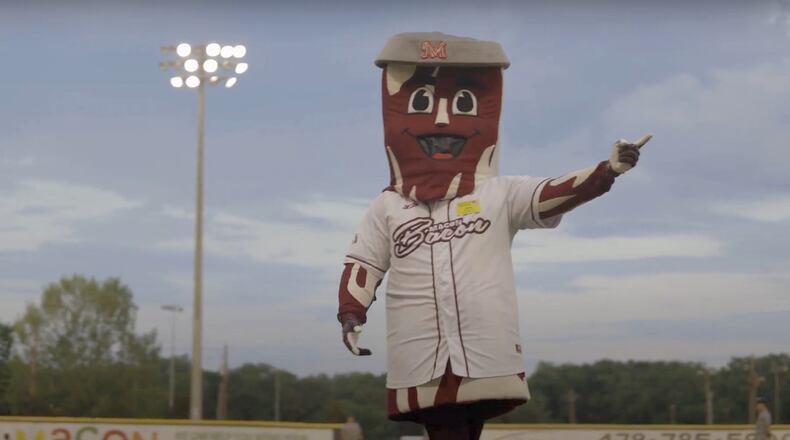Brandon Raphael was looking through his team’s mail earlier this month when he came across a large envelope. Inside was a letter from doctors urging his collegiate summer baseball team – the Georgia-based Macon Bacon – to consider their fans’ health.
“Macon Bacon’s glorification of bacon, a processed meat that raises the risk of colorectal cancer and other diseases, sends the wrong message,” it stated, urging Raphael to change the name. The letter was signed by the Physicians Committee for Responsible Medicine, a D.C.-based nonprofit organization that promotes plant-based diets.
Raphael, president of the Macon Bacon, initially thought the letter was a joke. But the group’s stance became even clearer days later, when it posted a billboard on the main highway in Macon, Ga., that read, “Macon: Keep Bacon Off Your Plate.”
Raphael said he rejects the claims about the Macon Bacon glorifying bacon. On Friday, he held a news conference at the team’s stadium in hopes of ending the controversy.
“Macon Bacon will be sizzling forever and will not consider a name change ever,” Raphael declared as supporters cheered.
The name, which fans selected from a poll when the team was created in 2017, has come to reflect the team’s lighthearted and playful spirit, Raphael told The Washington Post. It isn’t intended to endorse the cured meat, he added.
“Everybody loves the name, and we do, too,” Raphael said.
Macon hosted a minor league team for about a century before the Macon Braves moved to Rome, Ga., in 2003.
In 2017, baseball returned to the city with a summer collegiate team, which hosts college players from across the United States for a few months every year.
The organization asked fans to suggest team names. After receiving nearly 1,500 submissions, the club narrowed its options to Macon Bacon, Macon Heat, Macon Hits, Macon Noise and Macon Soul. Macon Bacon won an online poll by a landslide, Raphael said, and was announced as the official team name in September 2017.
The team later revealed its mascot: a 7-foot-tall strip of bacon named Kevin, in honor of the actor Kevin Bacon. Employees who provided entertainment between innings were named the “Sizzle Squad.” And the team’s hats and jerseys bear letters and numbers that look like bacon strips.
Fans can get in on the bacon theme, too. At the concession stand, the options include bacon wrapped in more bacon and bacon-loaded fries, and bacon can be added to any other item on the menu.
Raphael, 46, said it’s all in good fun. But the Physicians Committee for Responsible Medicine said there could be serious consequences.
Anna Herby, the committee’s nutrition education program manager, has worked with dozens of patients with cancer. She wishes they had been educated about the dangers of processed meats.
On June 1, Herby wrote the letter suggesting that Raphael change the team’s name to “Macon Facon Bacon,” referring to a vegetarian version of the food. She referenced research that found that eating bacon can increase the risk of colorectal, pancreatic and prostate cancers, cardiovascular disease and death.
“Bacon is so popular, and we just don’t hear enough about the risks of certain foods,” Herby told The Post. “What we do is just do our best to change that environment so that it’s easier for people to make those healthy choices.”
On June 6, the committee raised the anti-bacon billboard on Interstate 16, including an image of a skull above a home plate.
Raphael said he didn’t plan to respond to the letter, but as news outlets reported on the controversy, he made a statement.
“We are here for our fans,” Raphael said Friday. “We are here for our community. And we are here for bacon.”
Herby didn’t expect an immediate name change, but she hopes the team will at least offer fans more plant-based food options.
“People are upset when they learn that bacon isn’t healthy, but I hope that it plants a seed for maybe one day down the road,” Herby said. “When people are ready to make changes, they can remember the risks and know that there are healthier options.”
The Macon Bacon isn’t the only sports team facing calls for change from the physicians group. It recently said the Indianapolis 500, where champions pour milk on themselves, and the Milwaukee Milkmen, an independent baseball team, were glorifying the beverage.
In recent years, dozens of sports teams have changed mascots long considered offensive, including the Washington Commanders and the Cleveland Guardians. But no prominent teams have altered their names because of food-related health concerns.
That won’t change anytime soon. The Macon Bacon sold out all of its 3,256 tickets before its last home game on Saturday.
“Bacon is forever,” Raphael said. “And that’s where we’re at.”
About the Author
Keep Reading
The Latest
Featured


